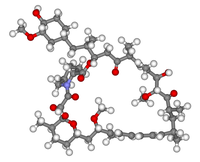
Photo from wikipedia
Implantation of mammalian target of rapamycin (mTOR)-inhibitor drug-eluting stents (DESs) impairs coronary endothelial function. There are no known non-invasive biomarkers of coronary endothelial dysfunction. We aimed to assess the association… Click to show full abstract
Implantation of mammalian target of rapamycin (mTOR)-inhibitor drug-eluting stents (DESs) impairs coronary endothelial function. There are no known non-invasive biomarkers of coronary endothelial dysfunction. We aimed to assess the association between serum interleukin-1beta (IL-1β) and coronary endothelial dysfunction in patients with mTOR-inhibitor DES implantation and to investigate the association between the mTOR pathway and IL-1β. We enrolled 35 patients who had implanted DESs for coronary artery disease. At a 10-month follow-up, peripheral venous blood samples were collected to measure IL-1β levels. Coronary endothelial dysfunction was evaluated by intracoronary infusion of incremental doses of acetylcholine. Serum IL-1β levels were significantly associated with the magnitude of vasoconstriction to acetylcholine at the segment distal (P < 0.05) but not proximal to the stent. Serum IL-1β levels were positively correlated with stent length (P < 0.05). To examine the direct effects of mTOR inhibition on IL-1β release, sirolimus was incubated in cultured human umbilical vein endothelial cells (HUVECs) or coronary artery smooth muscle cells (CASMCs). Sirolimus directly increased IL-1β mRNA expression (P < 0.01) and enhanced IL-1β release into the culture media (P < 0.01) in CASMCs, but not in HUVECs. Inhibition of mTOR triggers IL-1β release through transcriptional activation in CASMCs. Serum IL-1β levels are a potential biomarker for mTOR-inhibitor DES-associated coronary endothelial dysfunction.
Journal Title: Heart and Vessels
Year Published: 2017
Link to full text (if available)
Share on Social Media: Sign Up to like & get
recommendations!